
Beverly Pagone, PMBA 44
Beverly Pagone, PMBA 44, contributed this post on behalf of Olin’s Center for Experiential Learning, which sponsors the Global Management Studies course.
I’ve just returned from an eight-day trip to Japan where I visited three major cities and had a whirlwind of educational and cultural experiences. And yes, you read that right, it all happened in just eight days.
This wasn’t a vacation. I went as part of the Global Management Studies course at Washington University’s Olin Business School. I visited several top Japanese organizations, including Bank of Japan, the Tokyo Station Hotel, L.E.K. Consulting, Japan Railway Central, Fast Retailing (Uniqlo), Toyota, Suntory, and Gekkeikan.
On top of that, the trip included countless precious cultural experiences: a traditional tea ceremony, dinner on a Yakata Bune boat, a ride on the bullet train, and zen meditation. In addition, we traipsed around the Kiyomizu-dera Temple in Kyoto wearing a traditional kimono, visited Fushimi Inari Taisha and Osaka Castle, and enjoyed plenty of karaoke.
Thanks to the spectacular team of Olin students who led the trip, I had the time of my life and learned more than I could have imagined.

Risa Tawase learning how to be
a conductor on the Japanese bullet train.
Not only do I have endless memories to take away from this trip, I have gained concrete insights I can immediately apply to my life and work. These learnings come from both the experiences and the people I met during my journey through Japan.
Omotenashi
A Japanese term that signifies the unique, detail-oriented, customized hospitality practiced in Japan. Omotenashi became evident when I visited the Tokyo Station Hotel. When a guest arrives for their stay, the staff will take special care to learn about their likes and needs, and will cater service to each individual guest, providing special arrangements and gifts.
Furthermore, all guests complete a feedback form upon checkout where comments are put into real action to help improve the hotel and guest experience. They are really listening and acting on guest insights and requests.
In addition, the concept of omotenashi is about offering the best possible service without the expectation of a reward. Providing a high level of customized service is simply expected. In fact, tips are not customary in Japan.

Paulina Owens and Beverly Pagone at the
Ryokan, a traditional Japanese hotel.
Seeing this principle in action reinforced the importance of listening to the needs of my client. It’s important to not only ask for feedback on my performance, but to act on feedback I receive. And that is exactly where I intend to focus more in my current role.
Punctuality
One thing our group focused on while in Japan was being strictly on time for all our appointments, which, of course, in Japan means being at least 15 minutes early. People’s time is something to be respected in Japanese culture. This concept was clear during our visit to Japan Railway Central, which operates with an average train delay of under a minute.
If a train is scheduled to arrive at 3:02 p.m., it will be there right on time, so you had better be on time, too. This almost certain punctuality helps everything run smoothly and problem free. It is one of the reasons we were able to pack so many amazing experiences in such a limited time. More focus on consistent punctuality is definitely something I would like to bring back with me and apply to my work life.
Details
Japanese culture is detail-oriented to say the least. Every facet of life is well thought out. From my hotel room key, which turned on the lights in the room, to the seamless public transit system, which just works, and will take you anywhere you need to go at low cost.
This attention to detail is expressed in their business analysis, where errors and issues are tracked to the root cause, allowing targeted improvements to be executed. This concept came through during our visit to Toyota.
The production line has what is called an “andon cord” running along the entire length, which any worker can pull to alert others of an issue that needs immediate attention, preventing a chain reaction. I plan to take a page out of the Japanese book and bring a closer focus on the details, because small things can make a big difference.
Balance
Maintaining omotenashi, strict punctuality, and attention to detail makes for hard work and long hours. But Japanese culture balances all this hard work with some fun and relaxation as well.
I got a taste of this balance during our calming zen meditation experience and the fun-filled nights of karaoke. Not to mention the ultra relaxing onsen hot spring baths, where we had the pleasure of experiencing a stay at a traditional Japanese hotel, or Ryokan.
These traditions offer an oasis and balance to an otherwise work-filled, timetabled schedule. I intend to incorporate this balance into my daily life, because all work and no play makes for a dull life.
Ichi-go ichi-e
This literally translates to “one time, one meeting,” and became one of the favorite phrases learned on the trip. It is traditionally said at the close of a tea ceremony to signify the fact that this one tea ceremony will never happen again at the same time, or in the same way.
It is a way to honor the moment and remember that it is precious and unique. Every moment is a once-in-a-lifetime experience and should be respected, treasured, and cherished. This phrase will continue to serve for me as a constant reminder to live in the present moment and live my life to the fullest.
Applying to work as well, if you are present and performing at your best, you will be able to reach your full potential and do your best work. This is one of my favorite takeaways from the trip.
I started the Global Management Studies course with a limited knowledge of Japan and Japanese culture and left with a deeper understanding and insight, and some concrete takeaways that I can immediately apply to my work and life—including the concept of omotenashi, or wholehearted service, punctuality, attention to detail, balance, and living in the moment, encompassed by the phrase ichi-go ichi-e.
Pictured above: Front row: Wataru Toyohara, Kazuki Urushihara, Beverly Pagone, Camden Civello, Ariel Washington, Daniel Elfenbein. Back row: Julie Kellman, Nick Wolzniak, Jarrad Solomon, Risa Tawase, Takashi Otsuka, Sydney Miller, Elizabeth Hailand, Rachel Goldberg, Farrah Quershi, Jessica Jackson, Susie Fontana, Stephanie Fiet, Paulina Owens, Greg Brown, Robert Siedel.







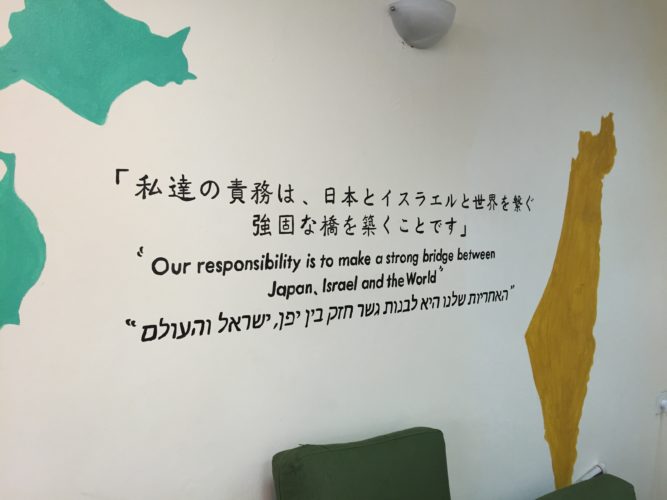
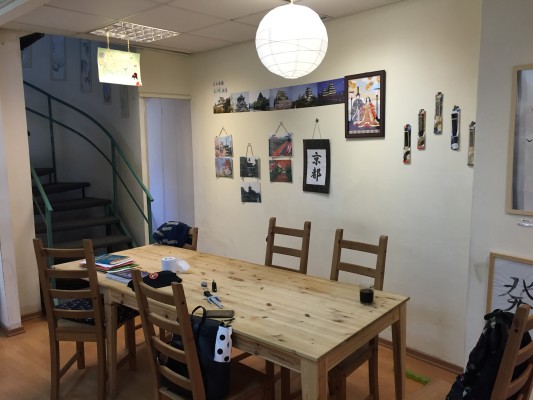 Founded in Tokyo, Samurai House is the largest startup accelerator in Japan. It shares the same goal with StartupEast to connect the startup and innovation ecosystems of Asia and Israel.
Founded in Tokyo, Samurai House is the largest startup accelerator in Japan. It shares the same goal with StartupEast to connect the startup and innovation ecosystems of Asia and Israel.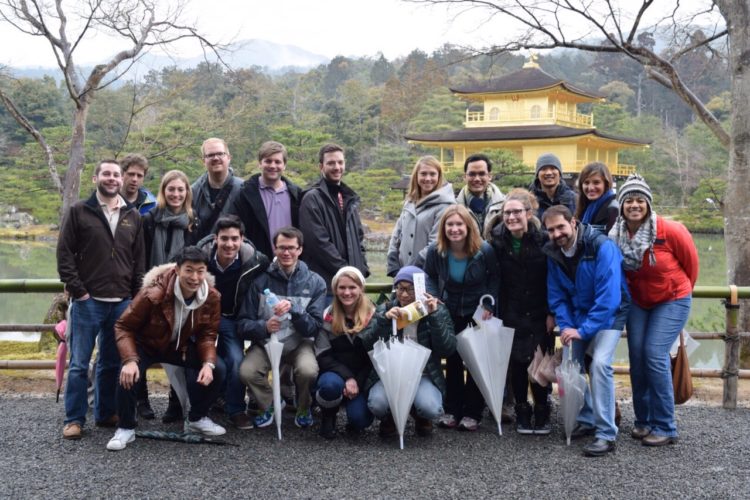
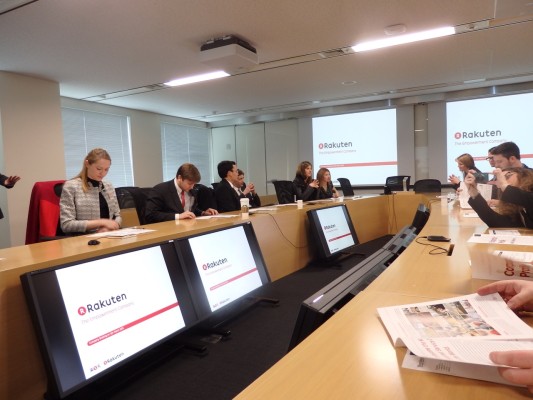 “I enjoyed learning about Rakuten and the vast array of companies and industries it is involved in. Rakuten is rapidly expanding, and since studying it, I have seen Rakuten multiple times.
“I enjoyed learning about Rakuten and the vast array of companies and industries it is involved in. Rakuten is rapidly expanding, and since studying it, I have seen Rakuten multiple times.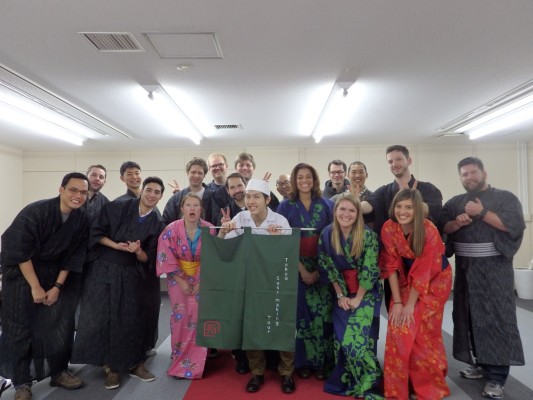 “The cultural experience is something that could not have been learned in a traditional course. Japanese business culture is very formal and polite. The extent to which respect and formality are important in the culture could not be experienced in a course. This may help me in my business career because I plan on working in M&A consulting. Many acquisitions are international, and understanding other cultures will help me interact with international professionals when I am working on these deals.” Louis Milone
“The cultural experience is something that could not have been learned in a traditional course. Japanese business culture is very formal and polite. The extent to which respect and formality are important in the culture could not be experienced in a course. This may help me in my business career because I plan on working in M&A consulting. Many acquisitions are international, and understanding other cultures will help me interact with international professionals when I am working on these deals.” Louis Milone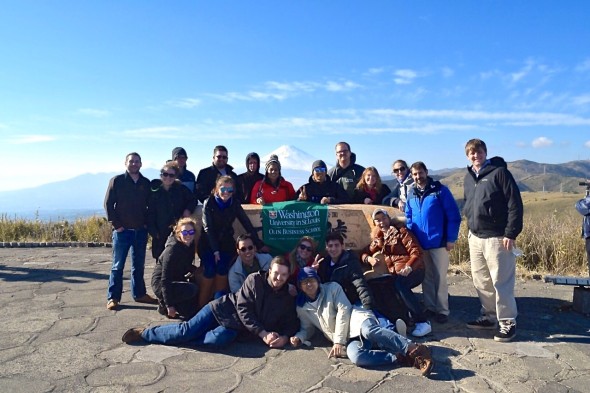 “Attention to detail is a trademark of Japanese companies and their employees in everything they do. This transcends relationships between companies and their customers as well as business to business relations. It applies to manufacturing processes where every detail is attended to and perfected; products are thought out carefully and done in best way and quality possible including the packaging and final presentation to the customers; when dealing with partners such things as little gifts for visitors always take place; attention to details and dedication also take place in everyone’s daily life.” Alexandra (Sasha) Sukhareva
“Attention to detail is a trademark of Japanese companies and their employees in everything they do. This transcends relationships between companies and their customers as well as business to business relations. It applies to manufacturing processes where every detail is attended to and perfected; products are thought out carefully and done in best way and quality possible including the packaging and final presentation to the customers; when dealing with partners such things as little gifts for visitors always take place; attention to details and dedication also take place in everyone’s daily life.” Alexandra (Sasha) Sukhareva